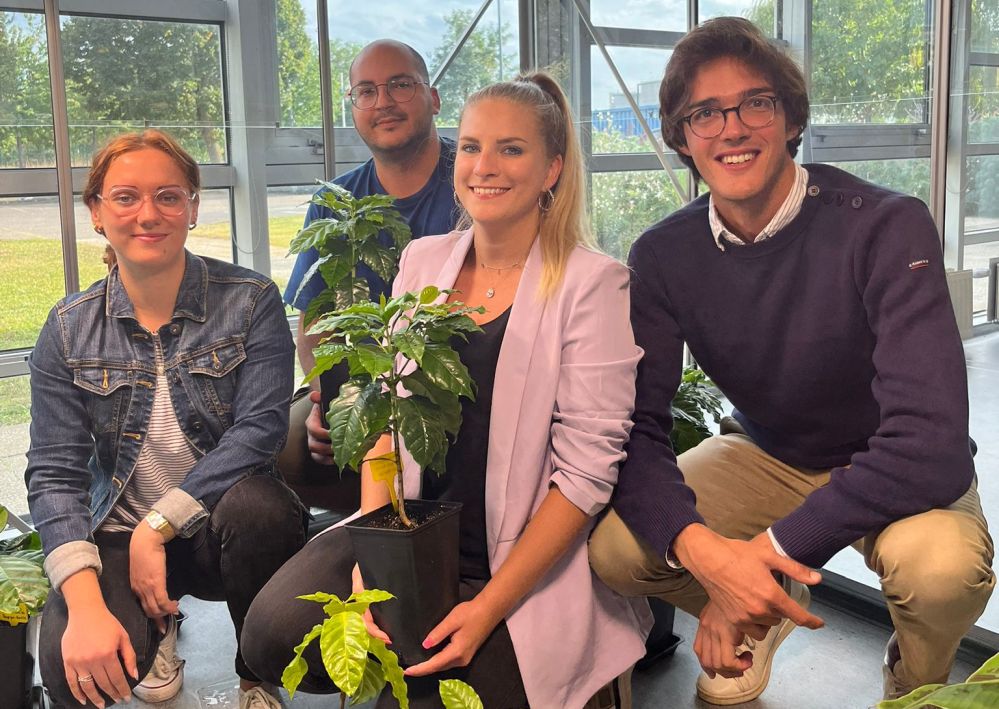[Disclosure: AgFunderNews’ parent company, AgFunder, is an investor in Amatera.]
- Amatera, a French startup developing climate-smart perennial crops including a new coffee variety with the resilience and yields of Robusta and the taste of Arabica, has closed a €1.5 million ($1.6 million) pre-seed round led by PINC, the venture arm of food and beverage co Paulig.
- The round—which was backed by Exceptional Ventures, Mudcake, Joyance Partners, Agfunder, and biotech entrepreneurs including Nicolas Morin-Forest from Gourmey—will help the Paris, France-based startup scale up its non-GMO breeding platform.
- “Coffee has traditionally not received as much research and innovation as many other crops globally, and as coffee is one of Paulig’s core products, we are of course happy that Amatera’s first solution involves coffee,” said Marika King, head of PINC. “Our discussions with trading houses and customers show huge interest.”

Robusta, minus the bitterness; Arabica, minus the caffeine:
Cofounded in May 2022 by Omar Dekkiche (CEO) and Dr. Lucie Kriegshauser, who met through Entrepreneur First, a platform bringing together founders in multiple fields, Amatera’s accelerated trait discovery and plant breeding platform “has the potential to develop more climate resilient crops and go to market more quickly than [companies using] traditional breeding methods,” claimed AgFunder’s Ryan Lee.
The startup’s first target is the world’s second-most consumed beverage, coffee, a crop that is attracting significant attention in the agrifoodtech field as climate change negatively impacts yields and reduces the land available for cultivation.
Right now, Amatera has two breeding programs. The first is ‘Robustica,’ a variety of Robusta without the bitterness that has traditionally forced the more robust and climate-resilient coffee variety to play second fiddle to Arabica. The second is an Arabica variety that is naturally caffeine-free.
Plant cell culture combined with accelerated natural evolution process
In both cases, Amatera is using plant cell culture (growing plant cells in vitro in culture rather than growing mature plants in water or soil) to develop its varieties, inducing spontaneous genetic variation using physical and chemical approaches, but without deploying gene editing or traditional GM techniques, Dekkiche told AgFunderNews in a recent interview.
“Combining in vitro plant cell culture with our accelerated natural evolution process is new as most companies are focused on seeds or gene editing. We work with cells and then once we have what we want, we can regenerate a plant that can grow in the field.”
He added: “Coffee is under threat but today it can take more than 20 years to create a new coffee variety with conventional breeding techniques. We are accelerating the breeding of perennial crops including coffee to create new varieties much faster such as a Robusta that tastes like an Arabica. We’re also developing an Arabica variety that is naturally caffeine-free, which saves a huge amount of time, money and energy, as the standard way to decaffeinate coffee is by rinsing beans with a chemical solvent.”
“Our approach is based on accelerating the natural evolution of the plant, so we are not editing the genome, but accelerating natural evolution by identifying at the cellular level the line that has mutated in the way that we want, whether it’s to have less bitterness, or no caffeine.
“We are non-GMO and we don’t need to get regulatory approvals to put our varieties on the market and commercially sell the beans. So that’s a big advantage.”
While there are several coffee species that are naturally caffeine-free that could potentially be developed, they don’t have the taste or agronomic performance of Arabica, he observed.
“Our approach is based on accelerating the plant’s natural evolution at the cellular level, which is an alternative non-GMO route to genome editing. The technology as such is not new, but applying it to perennial crops such as coffee is, since they are more complicated and require several breakthroughs in cell biology. This is also why gene editing techniques are struggling. Our technology is a real game-changer and opens up the avenue to applying it on several other crops such as cacao, bananas and grapes or even pharmaceutical plants.” Lucie Kriegshauser, CTO, Amatera

First production in 2027
Dekkiche, who is expanding the team this year with experts in cell biology and molecular biology, explained: “We aim to have all our development at a cellular level [in plant cell culture] done by the end of 2024 and then we’ll start producing the beans in the field, and that will take at least two years, and so we expect first production by 2027.”
But how does Amatera know whether the new varieties will have the same yields and performance the industry requires?
According to Dekkiche: “We know the genes that are responsible for the bitterness or the caffeine, so we are able to be highly selective and we don’t see these impacting other aspects of the plants’ growth.”
As for the business model, there are two approaches, he said. The first is to license varieties to coffee trading houses, and the second is to develop new varieties—spanning everything from coffee to cacao, bananas and grapes—in partnership with large food companies.
“Most Arabica coffee plantations around the world are established with the varieties resulting from breeding efforts initiated some 50 years ago. However, these varieties are susceptible to disease outbreaks, and are poorly adapted to the changing climatic conditions observed in many coffee-growing regions. Rising temperatures are expected to reduce the area suitable for growing Arabica coffee by up to 50% in 2050, and 26% of global coffee production is already lost to diseases every year.” Omar Dekkiche, CEO, Amatera




